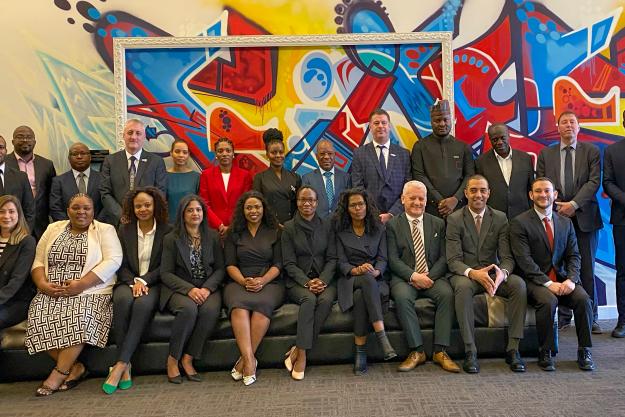
THE HAGUE, Netherlands—8 May 2024—The Organisation for the Prohibition of Chemical Weapons (OPCW) and South Africa’s National Authority for the Chemical Weapons Convention held a regional workshop on Best Practices in the Development of Legislative and Regulatory Framework on Chemical Security for African countries from 10 to 12 April 2024 in Pretoria, South Africa.
As chemical industries and trade in chemicals continue to expand, an increasing number of States Parties to the Chemical Weapons Convention are recognising the need to adopt appropriate chemical security measures or enhance their existing legal regimes to avert any potential risk of an attack on a chemical facility or the unlawful release or theft of toxic chemicals.
Throughout this three-day regional workshop, delegates explored pertinent methodologies and identified best practices in developing legal texts on chemical security. Specifically, the participants shared best practices in assessing national and region-specific risks and threats in relation to chemical security—covering the entire chemical life cycle— and discussed how to identify related gaps in existing legal and regulatory regimes. The outcomes of such assessments offer a good starting point for developing a new or enhancing an existing legal framework on chemical security.
Experts from INTERPOL, the World Customs Organization, and the chemical industry added crucial technical insights from their professional perspectives to the discussions.
This event is the final part of a series of best practices regional/sub-regional workshops on this theme. Similar events were previously held in Thailand and El Salvador in 2022, focusing on the Asia and Latin America and the Caribbean (GRULAC) regions, respectively. Key outcomes of these workshops will be consolidated in the form of a compendium of best practices and made available to OPCW Member States in 2025.
Twenty-two delegates from eleven African Member States participated: Algeria, Angola, Botswana Cabo Verde, Ethiopia, Kenya, Morocco, Nigeria, Seychelles, South Africa and Uganda
Background
Article VII covers national implementation of the Chemical Weapons Convention and requires each State Party to enact implementing legislation at the national level. Comprehensive legislation at the national level is essential for preventing the re-emergence of chemical weapons.
The OPCW organises regional workshops to assist States Parties in developing strong national legal and regulatory frameworks for chemical security. Chemical security refers to measures to prevent deliberate releases of toxic chemicals and to mitigate the impact if such events occur. In a wider context, it also includes policies to prevent attempts to acquire toxic chemicals or chemical weapons precursors.
As the implementing body for the Chemical Weapons Convention, the OPCW, with its 193 Member States, oversees the global endeavour to permanently eliminate chemical weapons. Since the Convention’s entry into force in 1997, it is the most successful disarmament treaty eliminating an entire class of weapons of mass destruction.
In 2023, the OPCW verified that all chemical weapons stockpiles declared by the 193 States Parties to the Chemical Weapons Convention since 1997 — totalling 72,304 metric tonnes of chemical agents — have been irreversibly destroyed under the OPCW’s strict verification regime.
For its extensive efforts in eliminating chemical weapons, the OPCW received the 2013 Nobel Peace Prize.
